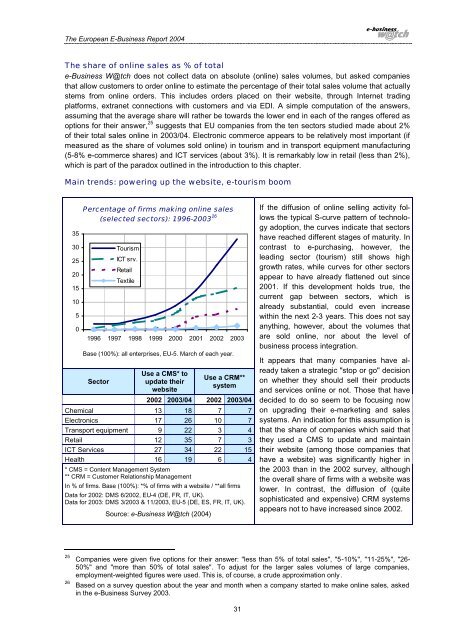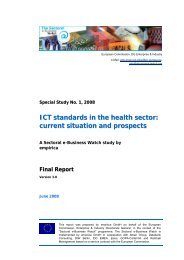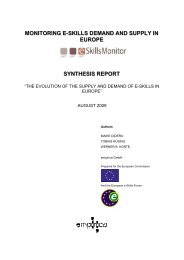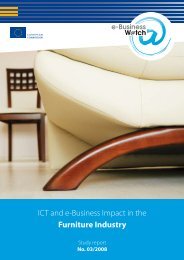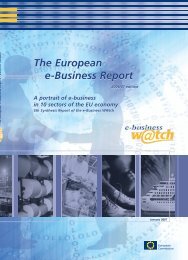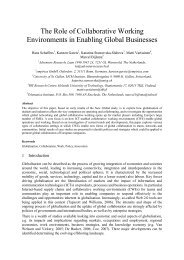The European e-Business Report 2004 - Berlecon Research GmbH
The European e-Business Report 2004 - Berlecon Research GmbH
The European e-Business Report 2004 - Berlecon Research GmbH
Create successful ePaper yourself
Turn your PDF publications into a flip-book with our unique Google optimized e-Paper software.
<strong>The</strong> <strong>European</strong> E-<strong>Business</strong> <strong>Report</strong> <strong>2004</strong><strong>The</strong> share of online sales as % of totale-<strong>Business</strong> W@tch does not collect data on absolute (online) sales volumes, but asked companiesthat allow customers to order online to estimate the percentage of their total sales volume that actuallystems from online orders. This includes orders placed on their website, through Internet tradingplatforms, extranet connections with customers and via EDI. A simple computation of the answers,assuming that the average share will rather be towards the lower end in each of the ranges offered asoptions for their answer, 25 suggests that EU companies from the ten sectors studied made about 2%of their total sales online in 2003/04. Electronic commerce appears to be relatively most important (ifmeasured as the share of volumes sold online) in tourism and in transport equipment manufacturing(5-8% e-commerce shares) and ICT services (about 3%). It is remarkably low in retail (less than 2%),which is part of the paradox outlined in the introduction to this chapter.Main trends: powering up the website, e-tourism boom35302520151050Percentage of firms making online sales(selected sectors): 1996-2003 26TourismICT srv.RetailTextile1996 1997 1998 1999 2000 2001 2002 2003Base (100%): all enterprises, EU-5. March of each year.SectorUse a CMS* toupdate theirwebsiteUse a CRM**system2002 2003/04 2002 2003/04Chemical 13 18 7 7Electronics 17 26 10 7Transport equipment 9 22 3 4Retail 12 35 7 3ICT Services 27 34 22 15Health 16 19 6 4* CMS = Content Management System** CRM = Customer Relationship ManagementIn % of firms. Base (100%): *% of firms with a website / **all firmsData for 2002: DMS 6/2002, EU-4 (DE, FR, IT, UK).Data for 2003: DMS 3/2003 & 11/2003, EU-5 (DE, ES, FR, IT, UK).Source: e-<strong>Business</strong> W@tch (<strong>2004</strong>)If the diffusion of online selling activity followsthe typical S-curve pattern of technologyadoption, the curves indicate that sectorshave reached different stages of maturity. Incontrast to e-purchasing, however, theleading sector (tourism) still shows highgrowth rates, while curves for other sectorsappear to have already flattened out since2001. If this development holds true, thecurrent gap between sectors, which isalready substantial, could even increasewithin the next 2-3 years. This does not sayanything, however, about the volumes thatare sold online, nor about the level ofbusiness process integration.It appears that many companies have alreadytaken a strategic "stop or go" decisionon whether they should sell their productsand services online or not. Those that havedecided to do so seem to be focusing nowon upgrading their e-marketing and salessystems. An indication for this assumption isthat the share of companies which said thatthey used a CMS to update and maintaintheir website (among those companies thathave a website) was significantly higher inthe 2003 than in the 2002 survey, althoughthe overall share of firms with a website waslower. In contrast, the diffusion of (quitesophisticated and expensive) CRM systemsappears not to have increased since 2002.2526Companies were given five options for their answer: "less than 5% of total sales", "5-10%", "11-25%", "26-50%" and "more than 50% of total sales". To adjust for the larger sales volumes of large companies,employment-weighted figures were used. This is, of course, a crude approximation only.Based on a survey question about the year and month when a company started to make online sales, askedin the e-<strong>Business</strong> Survey 2003.31


